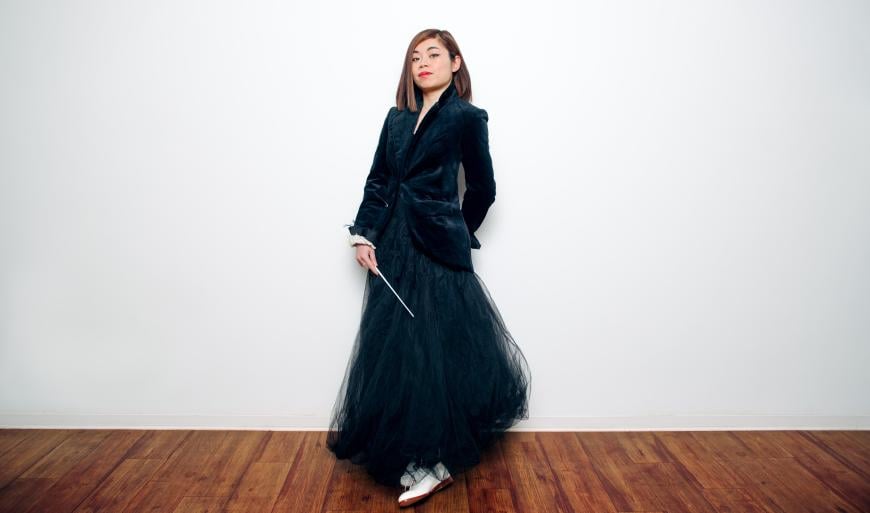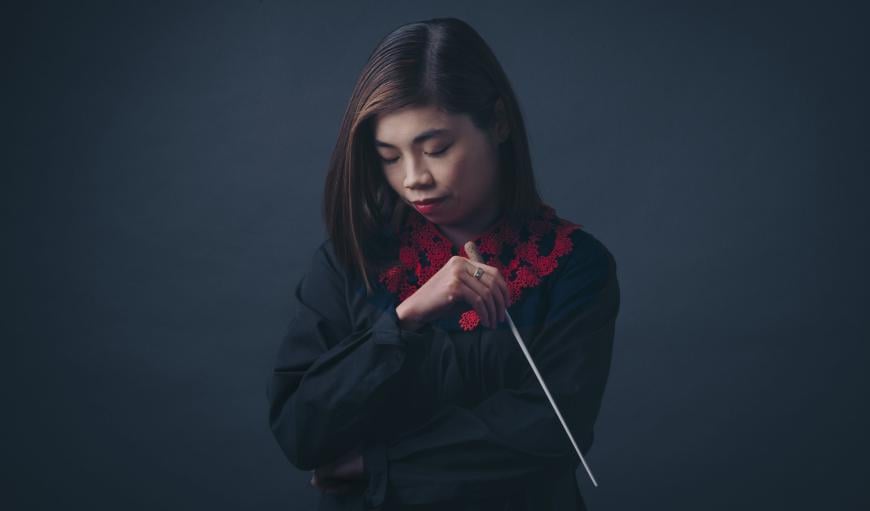
Life could have easily played out very differently for Hong Kong-born conductor Elim Chan, who made history in 2014 when she became the first woman to win the London Symphony Orchestra’s Donatella Flick Competition at age 28.
As a teenager, Chan wrestled with doubts over whether music was a feasible path. Her mentors, while wholly supportive, weren’t the sugarcoating type. The route to the podium would be an uphill one, they warned, and more so if she wanted to conduct an orchestra, not just a choir.
So, in her sophomore year at Smith College, Chan stood at a critical crossroads. Would she chase her childhood dream of conducting an orchestra, or would she choose the safer path of studying psychology? Subbing in for her college orchestra’s conductor during a rehearsal of Verdi’s Requiem so that he could hear it from the audience’s perspective, Chan got her answer.
“It was like a thunderbolt landed on my head, and my whole core was shaken,” Chan recalled. “I was like, ‘This is it. This is what I need to do. I love it.’”

After winning the Flick Competition and debuting as the LSO’s assistant conductor in 2015–2016, Chan’s career has been on a steady rise. In 2019, she was named chief conductor of the Antwerp Symphony Orchestra, becoming the youngest person and first woman ever to hold the position. In June, she announced she would be parting ways with the orchestra at the end of the 2023–2024 season to focus on her international career.
Chan’s Oct. 26–28 program with the San Francisco Symphony includes Gustav Holst’s The Planets and Benjamin Britten’s Les Illuminations, the latter featuring tenor Andrew Staples. Chan is replacing Daniel Harding, who withdrew from these concerts to conduct The Cleveland Orchestra on its now-canceled tour of Israel.
Ahead of her sooner-than-anticipated but very welcome return to the Bay Area, SF Classical Voice caught up with Chan, who was in Southern California conducting the Los Angeles Philharmonic. This interview has been edited for length and clarity.
You made your debut with the SF Symphony earlier this year. How do you feel about returning to work with the orchestra after that first experience?
From the first rehearsal, it was so clear that they collectively move as one [and] think as one, which is a wonderful quality for an orchestra. I love that they can lift it to another level in concert. Sometimes, you’re like, “OK, we rehearsed it,” and then it’s there and it’s safe, but it’s really nice that I could do something different in the concert and they would just run with me.
I’d been in touch with the orchestra management to make a future date, and suddenly this week came to me, and it’s like, “What a pleasant surprise to come back even sooner!” In that sense, I’m glad that I could help out and that I’m in the States. It’s just worked out so well that I had the week free.
You’ve previously written about how a performance of The Planets left a profound impact on you as a child, sparking your fascination with conducting. Could you tell us that story?
It was part of this school concert that I went to in Hong Kong … that [featured] a lot of hits from different huge pieces — like the “Sacrificial Dance” from [Igor] Stravinsky’s The Rite of Spring, “Mars” from The Planets, and the pizzicato [third] movement from [Pyotr] Tchaikovsky’s Fourth Symphony — really distinguishable pieces.
“Mars” I remember really powerfully … that whole beginning and how it exploded. … The next movement I learned about was “Jupiter,” which is so joyful and ecstatic, and it goes into this beautiful and moving hymn in the middle. It builds and builds, like a sea wave, and embraces you, then it goes back to this explosion of joy. Then, coming out from these two movements, you have “Mercury” and all these others, and at the end you have a women’s chorus finishing it off. I understand why people love [the piece]. The journey of going through all these movements — I can’t say no to that.
Was that your first orchestra concert?
Yeah, I’d never seen an orchestra at that point. You know, as an 8-year-old, you have no idea what you’re getting into. I played the piano, but [this was my first time] going into a concert hall. It was the Hong Kong Philharmonic, and at the time, there was actually a woman conductor, Yip Wing-sie. So that’s why I also thought it was never a question that a woman cannot conduct. Now, everyone is like, “Really?” But back in the day, that’s what I’d seen.
It obviously took some time for you to get from that little kid dreaming of conducting to actually being on the podium. Could you walk us through that journey?

It took some time because I just love a lot of things. I love music, but I also love the sciences, especially psychology. Another dream of mine was that I wanted to become a detective, something related to crime. I loved CSI shows, FBI stuff, Sherlock Holmes … solving mysteries. That’s why when I started [at Smith] College, I didn’t go to music directly. I didn’t need to choose a major when I began — it’s a liberal arts college — so I could just explore. I took classes thinking I was going into psychology to pursue that dream.
I loved music, but I didn’t think to actually become a professional musician. But then I joined the choir because I have sung all my life. During my audition, the conductor said, “You have really good ears. Why not be the assistant?” I said OK without knowing what that meant. Then she asked me if I would like to conduct one of the pieces in the fall concert. That actually started it. I thought music would just be a passionate hobby that I love, but that was music knocking on the door.
[In sophomore year,] we did Verdi’s Requiem. The conductor wanted to go to the audience seats to listen to the balance and asked me to conduct the “Dies irae” part. This was the next step, because it was with an orchestra and choir, and that was it for me. The “Dies irae” is very striking; it’s one of the most iconic moments in Western music. Come on, it’s literally the opening up of hell.
So, I moved from choral conducting to orchestra, and then I got opportunities because Smith was really, really supportive. Then, grad school at the University of Michigan, and the next thing that happened was the [Flick Competition], and that was the start of my career. That took me to Europe, so I moved to London, became the assistant conductor of the London Symphony, met the most wonderful maestros, people like Esa-Pekka Salonen, [the late] Bernard Haitink, Antonio Pappano, Simon Rattle, so many others. The next thing I did was the Dudamel Fellowship at the LA Phil, then I got to come here, and the rest is history.
You mentioned that you initially felt a bit hesitant about going into conducting. What were some of those doubts?
I didn’t think so much about being a woman and that it was a strange thing to want to be a conductor until my teachers started to say that. They were supportive, but they always said, “This is a really tough thing for women to do.”

At that time, there weren’t really a lot [of women orchestral conductors]. You had Marin Alsop [and] Susanna Mälkki. I understood suddenly that it’s not as expected that this is something you can pursue. The first [orchestral] conductor I’d seen in my life was a woman, but apparently that was an outlier.
Being an Asian, there’s this pressure of “Pursue arts? Really? Aren’t you smart enough to do other things?” Where I’m from, it’s always this feeling of “You need to [work in] business. You need to be a doctor, lawyer.” Those are the definition of success. There’s some sort of feeling that pursuing the arts is going to be hard. And it is hard.
In an essay you wrote for The Guardian in November 2016, you said that the gender issue is complex and that you’ve “felt there to be at times an imbalance of focus on my gender over my whole identity as a musician.” Nearly seven years later, do you feel that the classical music world has changed?
Change is happening, but it’s slow. There’s always [that] discussion of how much you want to push the change to happen, right? To make gender a nonissue, first you have to talk about it — you have to really bring into the spotlight [the fact] that there are not enough women conductors.

When I started, there were definitely fewer women conductors than there are now. Now, you actually have agencies who are really giving chances to women conductors, which is great, and I think more orchestras are open to giving opportunities [to women], which is wonderful. But I think we’re still at this point of having to talk about maybe a quota — like programming 50 percent women conductors and women composers. It’s so difficult because you almost have to push the pendulum to the extreme so that the change will happen.
Of course, a part of me wishes that the day will come when I don’t need to talk about being a woman anymore. I’m just Elim, and I’m a conductor. … A lot of work [still] has to be done. The one thing that is always important is that we need to make sure that there’s also quality [in what] we deliver because that’s the only way that we will push the whole wave forward.
You brought up quotas as one of the ways orchestras are trying to address gender disparities. What are some of the other steps you’d like to see the industry take to reach a wider audience?
Classical music is such an old dinosaur in some sense. We’re playing pieces from a long, long, long time ago, and we’re still in the hall and, in many ways, not flexible. The concert format’s still an overture, concerto, and symphony. COVID really pushed things to change. Now, you have orchestras who are doing earlier concerts and one-hour concerts without intermission. Actually, in L.A., we just did a one-hour 8 p.m. concert [as part of the LA Phil’s] Casual Fridays [series], where there’s no intermission, just a concerto and a piece, with the musicians introducing the piece.
Nowadays, it’s not enough to just change into my concert clothes, go onstage, and conduct. I think as a musician now and an artist, you need to connect with people, or else it really feels like an old museum piece. I want interaction, I want to make people feel something, I want people to ask questions. If the music makes you angry, if something in the music makes you happy, great! If the music makes you cry, cry. It’s OK. I want reactions, I want feedback. It’s our responsibility to reach out and to help people understand what we do.

Traditionally, there are a lot of rules at classical concerts, like no clapping between movements or making any noise until the piece is over. I’d love to hear your thoughts.
Maybe you’ve read about this, but in April, I was in L.A. conducting Tchaikovsky’s Fifth Symphony. There was someone who made a very strong scream, and it became a thing. I was at first really worried that the person was having a health emergency.
If you go back to Mozart’s or Beethoven’s time, people would do so many things when the music was being played. If the people loved a movement, they’d tell the orchestra to play it again. Over time, we’ve become very serious, and people don’t dare to react because there’s this notion of what is correct and what is not correct.
One time, I remember turning my back to the orchestra and applauding two women [in the audience] who were ecstatic and shouting. You could feel that it was probably their first time in the concert hall, so even I turned around and had to smile. And actually most of the musicians are really happy to hear that because they also want to be heard and to be appreciated.
I have to ask: After that viral moment at the LA Phil, did you ever find out what happened to the woman?
That person disappeared after the concert, and then it became what it is. I’m just very amused, and I have to laugh. All I can do is to wish that woman well because I was really worried.
As you prepare to leave the Antwerp Symphony Orchestra in 2024, what were some of the most memorable moments in your time there?
This was my first major job. Tours are what I remember really well because that’s the moment you can really learn about the orchestra. When you go to different places and you play the same pieces again and again, you really get out of your comfort zone and think about how to play in this hall versus that hall. It’s actually really fun to do that experiment together. And then, of course, you get to know each other much better.
I think the big pity is also that we went through COVID. I started in 2019, and very quickly, two years were lost. I was really glad that the orchestra kept playing. We recorded, and we tried to still give something. To have gone through that and then come back out strong and then tour — we did a tour of Spain just last season — that was really beautiful, and the audiences were really enthusiastic. I learned a lot, like how to work with management [and] how to tackle [certain] challenges. Looking back, I’m leaving with a lot of lessons.




